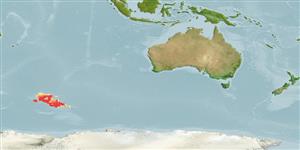Preferred temperature (Ref.
123201): 1.3 - 2.5, mean 1.8 °C (based on 23 cells).
Phylogenetic diversity index (Ref.
82804): PD
50 = 0.5020 [Uniqueness, from 0.5 = low to 2.0 = high].
Bayesian length-weight: a=0.00126 (0.00058 - 0.00275), b=3.47 (3.29 - 3.65), in cm total length, based on LWR estimates for this (Sub)family-body shape (Ref.
93245).
ট্রফিক পর্যায়ে (Ref.
69278): 3.3 ±0.54 se; based on food items.
Generation time: 4.2 ( na - na) years. Estimated as median ln(3)/K based on 1
growth studies.
স্থিতিস্থাপক (Ref.
120179): মাধ্যম , সর্বনিম্ন প্রজন দ্বিগুনের সময় ১.৪-৪.৪ বৎসর (Assuming tm=4; Fec = 2,770).
Fishing Vulnerability (Ref.
59153): Moderate vulnerability (44 of 100).
Climate Vulnerability (Ref.
125649): High to very high vulnerability (73 of 100).
Nutrients (Ref.
124155): Calcium = 27 [15, 56] mg/100g; Iron = 0.413 [0.189, 0.800] mg/100g; Protein = 17.5 [15.8, 19.2] %; Omega3 = 0.24 [0.12, 0.48] g/100g; Selenium = 23 [9, 53] μg/100g; VitaminA = 7.5 [1.5, 35.0] μg/100g; Zinc = 0.409 [0.275, 0.608] mg/100g (wet weight);
